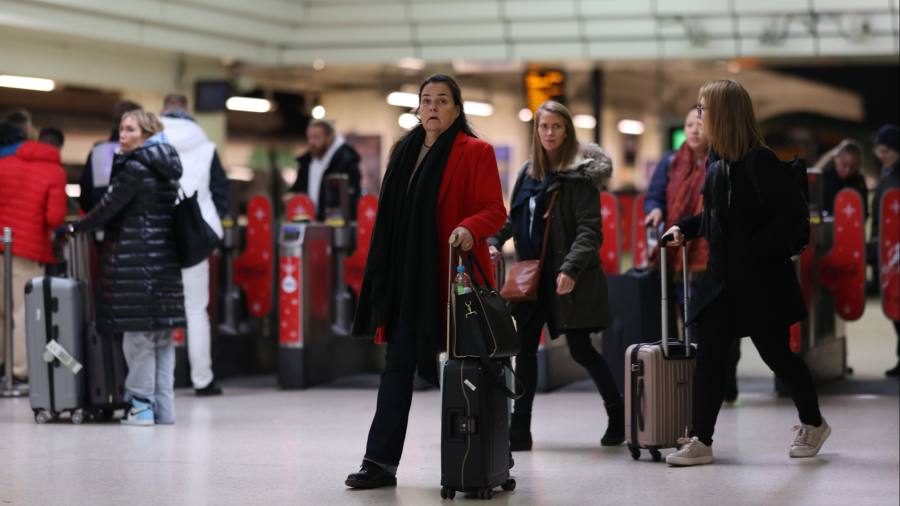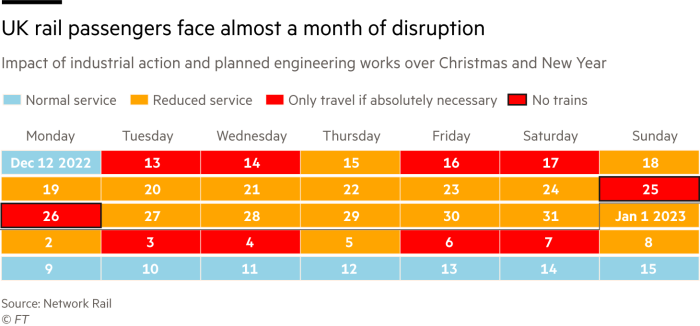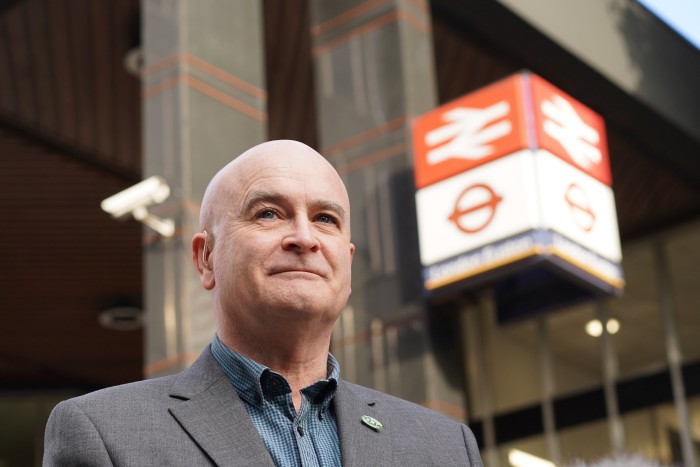
Four days of strikes will wipe out most services on Britain’s railways next week, at the start of the biggest disruption to the network since the late 1980s as unions begin a month of near-continuous industrial action either side of Christmas.
Railway bosses have urged passengers not to travel on Tuesday, Wednesday, Friday and Saturday as the RMT, TSSA and Unite unions all take industrial action in a long-running dispute over pay, working practices and job security.
Around half of the rail network will be closed on those days and only a fifth of services will run during limited hours from 7.30am to 6.30pm. There will also be knock-on disruption on Thursday morning.
But that is only the start. Network Rail, the infrastructure operator, has warned of reduced service and some disruption every day from December 13 to January 8, including another near shutdown of the network in the first week of the new year as commuters return to work.
For the rest of that period a combination of limited industrial action and the annual pre-planned Christmas engineering works will leave the railway with a reduced timetable.
The action will amount to the biggest disruption to the network since the national rail strike of 1989, said Roger Ford, industry and technology editor of Modern Railways, a specialist rail publication.

The railway employees, who have held a series of strikes since the summer, will be joined by workers from other sectors, including postal and NHS staff and civil servants, as the UK is hit by the worst industrial unrest in more than three decades with more than 1mn working days set to be lost to strike action in December.
Air passengers were warned to brace for long queues at passport control over Christmas as Border Force staff at six airports walk out from December 23 to December 31. Airports and airlines have warned of disruption, but are waiting for details on the Home Office contingency plans, which include bringing in about 600 soldiers to staff passport kiosks, before deciding whether to cancel any flights.
Chancellor Jeremy Hunt said on Friday that the government needed to be wary of giving in to calls for public sector pay rises as it would hamper efforts to bring soaring inflation back under control.
“We just have to be really careful not to agree to pay demands that have the opposite of the intended effect because they lock in high inflation,” he told the Financial Times’ Global Boardroom summit.
Business has warned of the economic impact of the strikes, with the hospitality industry particularly concerned about the impact on its busiest trading period.
UKHospitality, an industry body, estimated that the hit to revenues could total £1.5bn, with around 30 per cent of Christmas bookings cancelled on strike days.
The disruption “will be a big knock to the industry”, said Clive Watson, co-founder of City Pub Group, which operates 45 venues nationwide. “It’s the continual sapping of strength of the industry that is most frustrating.” Watson estimated that his central London venues will lose up to 40 per cent of expected revenues on strike days.

For the 120 restaurants, bars and retailers housed at Boxpark’s three pop-up sites across London, the strike action will be “really painful”, said chief executive Simon Champion. “Our whole strategy is to base ourselves close to train stations so it will be really disruptive.”
“[The strikes] have effectively wiped out the whole of the week,” said Kate Nicholls, UKHospitality chief executive. “The impact for the sector in terms of loss of revenue is getting close to the impact we saw with Omicron [coronavirus variant] last year.”
Andrew Haines, Network Rail chief executive, said the RMT, the biggest rail union with more than 40,000 members, had “deliberately chosen to try and ruin Christmas for millions of passengers and businesses”.
But Mick Lynch, the RMT’s general secretary, blamed the government for stopping the industry management from offering a higher pay deal and insisting on tough conditions on railway reforms in talks aimed at averting walkouts last week. “There is no chance of settling this dispute . . . we are blocked by the government,” he said.
The FT revealed that employers had planned to offer 10 per cent pay rises to the RMT but were stopped by the government, which controls the industry’s finances.
Network Rail eventually offered 9 per cent over two years and train operators 8 per cent. The smaller TSSA union has recommended its members accept only the Network Rail offer, while the RMT has said neither offer is acceptable. It has put the Network Rail deal to its members and urged them to reject it in a ballot closing on Monday.
The government said the offers on the table were “good” settlements that represent significant uplifts in pay. “The situation is incredibly disappointing, and unfair to the public, passengers and the rail workforce who want and deserve a deal,” it added.
Relations between the industry and the RMT could worsen next week with Network Rail set to restart efforts to push through reforms to its maintenance workforce, having paused consultations with affected staff during the recent negotiations with the union.